Listen:
Scroll down for a transcript, video, how to subscribe, and more
Episode Synopsis:
Welcome to Episode #59 of Habitual Excellence, presented by Value Capture.
Joining us again today is Eric W. Dickson MD, MHCM, FACEP, a returning guest. He is President and Chief Executive Officer at UMass Memorial Health. He was previously a guest in Episode #11, released in July 2020, earlier in the pandemic.
In today's episode, Eric follows up on our earlier discussion about their commitment to "no furloughs and no layoffs" and how that "might have been the best decision we made" during the pandemic, as Eric said.
Host Mark Graban also asks Eric questions and discusses topics including:
- Going through almost two years of this now, what have you learned about “Lean management in a crisis?”
- Lessons Learned? — Developing people during a crisis?
- A culture of Respect for People
- Staff now are exhausted -- how can we recover?
- When you talk about principles and values, including safety and respect, how did you handle the vaccine mandate?
- The role of a leader — Your role as the CEO during this?
Click to visit the main Habitual Excellence podcast page.
Watch on YouTube:
Quotes:
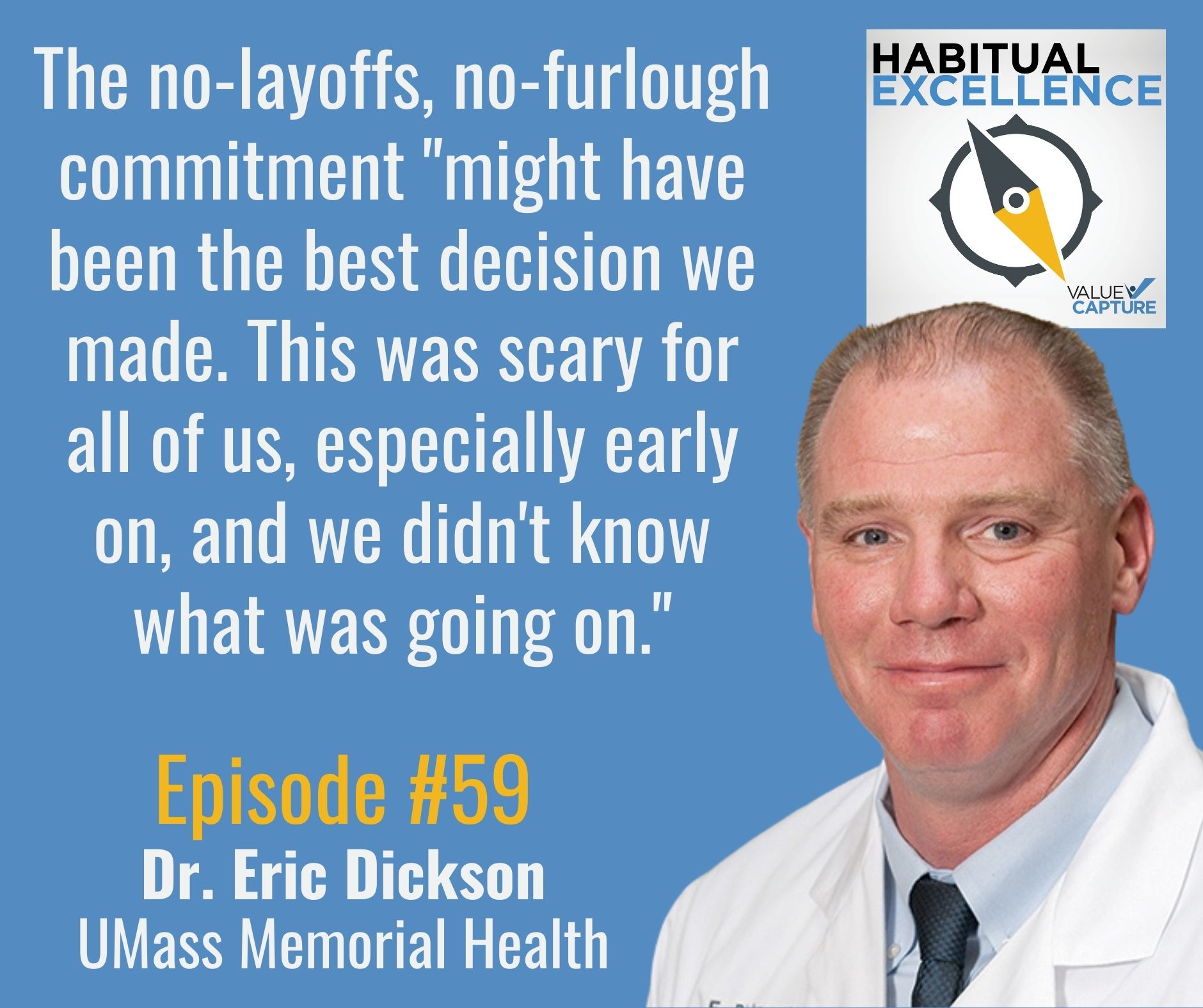
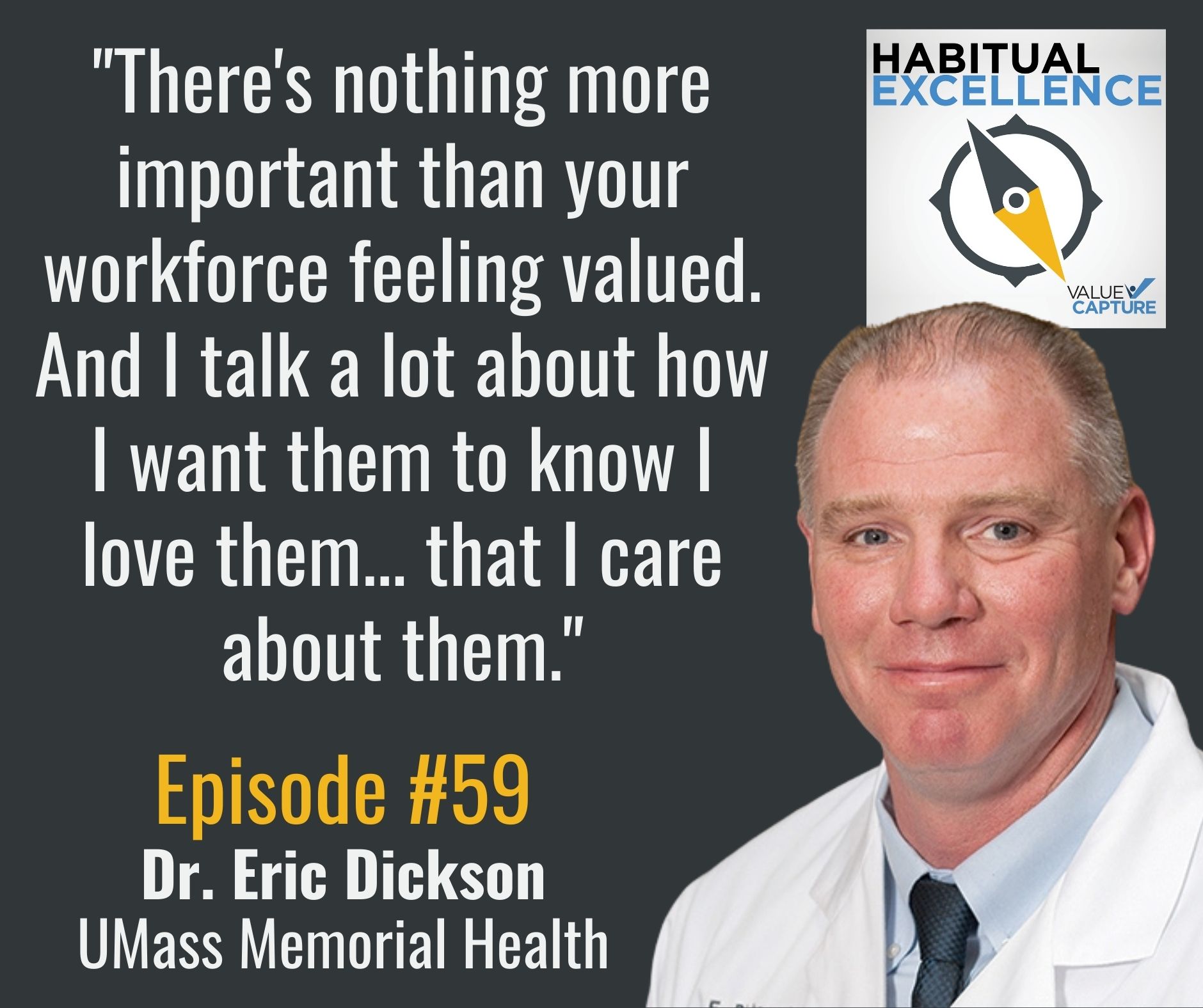
Subscribe:
To make sure you don't miss an episode, be sure to subscribe today! Please rate and review the podcast.
Transcript:
Mark Graban (2s):
Welcome to Habitual Excellence presented by Value Capture. This podcast, and our firm, is all about helping you and your organization achieve habitual excellence. Be a one unifying focus, one value based structure and one performance system. In other words, it's about helping you capture dramatically more value through achieving perfect care and perfect safety for patients and staff. To learn more about Value Capture and our services visit www.valuecapturellc.com. Well, hi everybody. Welcome to Habitual Excellence. So I'm Mark Graban from Value Capture. And today we have a returning guest.
Mark Graban (43s):
He is Dr. Eric Dickson. He's the president and chief executive officer at UMass Memorial Health. He was our guest in episode 11, that was released back in July 2020 much earlier in the pandemic. So, so first off, Eric, welcome back to the podcast. Thanks for joining us today.
Dr. Eric Dickson (1m 3s):
Oh, thanks so much for having me mark,
Mark Graban (1m 5s):
You know, first question, you know, we're going to follow up a bit on the last episode and cover some lessons learned that that you've experienced, but you know, first off as we record this on December 23rd, 2021, how are things at UMass Memorial? How are things in your communities?
Dr. Eric Dickson (1m 23s):
Well, it's, it's hard to believe here in the most vaccinated state in the country with really 90% of our population vaccinated, we're dealing with a third surge of COVID. That is about three quarters of the peak of the previous surges with no clear end in sight. And, but the team somehow is once again, rallying and taking care of patients and taking care of each other and just humble to, to be a part of this team.
Mark Graban (1m 57s):
And, and, and hopefully what's going on is more of an impetus for th the, the remainder of the communities to get vaccinated.
Dr. Eric Dickson (2m 5s):
Yeah, it's very clear that this is still a pandemic of the unvaccinated, despite being the most vaccinated state, more than 75% of our inpatient hospitalizations for COVID are unvaccinated individuals. So go out, get yourself vaccinated. If you already get vaccinated, you do for a booster, get boosted. We almost see zero hospitalizations from patients that have, as we say it here, got their booster. And, and that's what I hope you'll all do to keep yourself safe.
Mark Graban (2m 40s):
Yeah. Well, thank you. Thank you for that, Eric, you know, following up on the last episode, the last conversation you had shared, and I really appreciate it and admire this, you know, the no furloughs, no layoffs commitment. How did that play out beyond July, 2020?
Dr. Eric Dickson (2m 59s):
Might've been the best decision we made and that, you know, this was scary for all of us, especially early on, and we didn't know what was going on. And as we started to shut a lot of things down that are revenue producing, we started to see the red ink and we had been talking for years about a culture of respect for people and taking care of our people. And this was our chance to put our money where our mouth was, but little did we know then that our recovery after the surge, because we hadn't laid anybody off, we hadn't done any furloughs. And we kind of became the employer of choice for the region, allowed us to recover very quickly.
Dr. Eric Dickson (3m 42s):
And in both fiscal year 20 and 21, we were in the black and that is not at all what we expected. It would have been really hard to, to have terminated people or laid people off. And then later explain how you did that in a year that you made money. So if I had it to do over again, I'd do it the same way.
Mark Graban (4m 7s):
Thank you for sharing the reflections on that. And it sounds like, you know, if there was another crisis, same decision, same commitment to the people. So in, you know, it's been almost two years here, you know, I know you've reflected quite a bit. And, and, and to have some thoughts to share with us in terms of lessons learned about whether you frame it as lean management or leadership, or, you know, looking after and developing people. What are some of the key lessons learned from this crisis?
Dr. Eric Dickson (4m 40s):
There's been a lot, if you can have to start with the kind of, what's your management paradigm, what's that mental model in your head, when you think about what your job is as a leader to start with, and then adjust that to kind of a crisis situation. And I, I was so lucky that early on in my leadership career, somebody planted a mental model in my head that is still works for me. And that is that your job as a leader is to move your department, your piece as an organization, or in my case, the entire organization from where it is to where you aspire it to be that better place.
Dr. Eric Dickson (5m 23s):
And for us, we always talk about the perfect patient experience and a perfect caregiver experience, best place to give care, best place to get care. And that the job of leadership is to engage every one of your people every day in continuous daily improvement and moving towards that better state and constantly messaging of what that better state is. And, and as you work with your people, you're developing them into problem solvers and the better problem solvers you have, the faster you can move. And as you listen to your people and their ideas about how you can move from where you are to where you want to be now, they feel respected.
Dr. Eric Dickson (6m 3s):
They feel valued, and there's nothing more important than your workforce feeling valued. And I talk a lot about they, I want them to know I love them, right? That I care about them. And I do, and I have a lean coach that was in Toyota for 20 years. And she says, that's not lean. Right. And I said, I don't care. That's sort of that's me. Right? But it, it is respect for people, right? Do they feel like they have something to contribute? And when you, when a crisis hits you you've to make some adjustments, right? Because you're still talking about best place to give care, best place to get care.
Dr. Eric Dickson (6m 43s):
And, you know, in some ways, what I always say a crisis is a sudden deterioration of your current state. And you then have to lower your short term expectations and set goals for your organization that are going to get you through the crisis. And so when we went through the first surge, it was about getting PPE for our employees, right? So that they could be safe. It was about creating search capacity and creating a field hospital that ultimately took care of a thousand patients. It was about bringing in additional workforce to help staff those places.
Dr. Eric Dickson (7m 27s):
I think when you move into a crisis state, you've got to adjust to short term objectives, and then you have to empower individuals to make the decisions, to, to get those things done. And I, I said to the person that I put in charge of creating the field hospital, you are the CEO for this project. You make whatever decision you have to make to get this done, because you only have eight days. That's what we had the first time. And you didn't have to ask anyone's permission if you have to, you just say, Eric said, and, and they did an amazing, amazing job. But I guess the part that I didn't quite realize at the time is in giving people these tasks and the authority to move forward and they worked their tails off.
Dr. Eric Dickson (8m 18s):
Boy, did I develop some problem solvers through all of that? They emerged out of that with this sense that they could do anything. Sometimes it was hard to put them back into, into the cage a little bit, because if they want to move that fast all the time again. And I guess so, you know, one of the biggest learning lessons for me is that a crisis is an opportunity to develop your people. It's a super opportunity to develop your people and don't miss out on that. And there was a few situations where I put the younger person that was going to likely be with us for a longer period of time, instead of the more senior person in charge of a project.
Dr. Eric Dickson (9m 1s):
Cause I was thinking, you know, that person's going to retire next year. Am I, am I really focused to want to focus this opportunity on developing them? And I think much more about, you know, who can I who's that up in calmer that I can put on this because there's just, you know, when they, when they succeed, it'll carry them forward. And, and the whole team poured. And like we emerged from each of these surges stronger. I hope that's the case with this one because people are exhausted, but it is a real opportunity to strengthen the ties between the team and to develop your people and to, to come out stronger with every crisis, there is opportunity. And I think the biggest opportunity for us was a chance to develop leaders.
Mark Graban (9m 47s):
So a couple followup questions from that. I mean, I could see where oftentimes in a crisis people might say, it's, it's such a crisis. We don't have time to develop people. I need someone who's got the right answer right away. And, and, and, and there's, you know, this, this question of finding the balance of developing people versus solving the problem, developing your own solutions, versus there's often temptation, likewise, to go grab something, quote unquote, off the shelf. Like how, what kind of, did you have conversations with other leaders to find the right, the right, the right balance that was most effective?
Dr. Eric Dickson (10m 23s):
Yeah, it's a, it's a great point, mark. And I, I think, you know, being a faculty member in emergency department and teaching emergency medicine now for a couple decades, do you have a patient that comes in that's critically ill or injured, right? You've got your resident with you. And that resident at some point is going to have to be in an ER on their own and deal with this exact same patient. And, but at the same time, I'm the most experienced person there and perhaps getting an airway and maintaining it. So, you know, in, in, in training, physicians are constantly having this, all right.
Dr. Eric Dickson (11m 5s):
I want this person to develop because they were going to have to work on their own. And if I just do this myself, I might not, you know, I'm setting up some patient negative for five years from now, that's going to be in trouble because this resident didn't get that skill that they need. And I think there is a way to carefully be allow that person to develop, allow that person to make the mistakes while at the same time to be there for them. And I think the worst situation is, and this happens in academic medicine, medicine. When you say to somebody, a junior person, you know, call me if you need me, but it's a sign of weakness.
Dr. Eric Dickson (11m 45s):
And what I like to say is it's a sign of strength, right? I want you to do this on your own as much as possible, but if you need me, I'm going to be. And ultimately, you know, it's a sign that you're willing of humility and don't, don't worry about calling me and, and, and asking for help. And so I think that that's the balance that you can put them in charge of give them the project. You allow them to make decisions. And part of selecting the right person is selecting the person that knows when to call for help and when to try to do it on, on their own. And th and they just get better and better at it. So it is something that you have to take into consideration.
Dr. Eric Dickson (12m 26s):
There is a safe way to do it, and ultimately the rewards for having a, a great problem solver, a leader that has come more confidence in themselves because they've just turned a convention center into a field hospital, you know, an ICU bay. I mean, that's priceless.
Mark Graban (12m 45s):
Well, and oh, what I hear coming through loud and clear from what you're saying is, you know, things, decisions that are principles based principles, including providing the best care principal of developing people, a principle of, you know, one way of putting it might be, you know, doing the right thing for the right reason. I was wondering if you could elaborate one other illustration of that. I think you referenced back in the first surge, the need to provide PPE to help people working there feel safe. So how did short-term objectives driven by a crisis?
Mark Graban (13m 28s):
W w w what sort of response to that lead to,
Dr. Eric Dickson (13m 32s):
It's interesting that your, your values don't change because a crisis hit, and, but if you can strengthen your culture during it. So I, I must say, like when we first, when this first happened and we were talking about, do we need to, we had all these people standing around doing nothing really. And if a really good one said, let's work on clinic redesign. Since we're all here, we're all available. There's no patients here. This would be a good time to kind of figure out how, when the patients come back, we want to do things. That's the best opera opportunity, but, you know, you're looking at potential red ink.
Dr. Eric Dickson (14m 12s):
You're thinking about how you can reduce expenses. And you talk about respect for people for so long. It's just like, it was a little tough. I have to admit the first time. And we decided, and, and it worked out for us. And the same with the PPE, we spent a lot more money than a lot of other organizations on PPE, because we were willing to pay the extra to make sure that our people had what they needed. And now similar situations have come up. And just this Monday, we had our core team meeting and we needed to prepare for another big surge. And we didn't have the staff we needed.
Dr. Eric Dickson (14m 53s):
And there was a nursing agency that could get us nurses. And it was three to four times what we would typically pay for a nurse per hour. And we're all looking at each other saying, we don't know what the peak of the surge is going to be. If it gets worse and we don't have, you know, we're, we're going to be in big trouble. The patient's going to be in big trouble, but it's going to cost us another five to $10 million to bring these folks in and having made those decisions previously and had them all come, come back to us in spades in many ways, and being happy, we made the decisions and, you know, the team just looked around and said, yeah, we gotta bring them in.
Dr. Eric Dickson (15m 36s):
And we'll figure out the money later. And that's a big leap for an organization to start to say, do what you have to do to keep your people safe, to keep your patients safe for your customer. And you just have to figure out the money later and that in a crisis, you know, you can't always act in that way. And it's just like, this has solidified our culture for us. I even had some of my medical school professors come up to me and say, like, all that stuff you've been talking about all these years, it took this crisis to cement it in.
Dr. Eric Dickson (16m 17s):
And, you know, these are people that have known me for a long time. I carried their charts. I often use a example because when I was going through med school, we had paper charts and they, one of them said to me, we were always rooting for you, Eric, but I just don't think we believed all that. Right. But you were right. You were right. You know, we all need to become better problem solvers. And so I find the job now almost easier because all of the stuff we did for these, for the years of training, everybody in lean, like every new employee and, oh, that's expensive and standards of respect and how, you know, everybody has to go through that training and, you know, taking people off the line and now nobody nobody's questioning all whether or not we've got a return on investment in that, but it took a crisis for us in some ways.
Mark Graban (17m 18s):
Yeah. So, and then there was a time where you also had to choose your word, overpay for supplies when masks and gowns and face shields and things were in short supply. Right?
Dr. Eric Dickson (17m 30s):
Yeah. And it's, you know, I hate overpaying for anything. I hate over-hiring because it puts us at risk. Sometimes having too many people. And then you're in a situation where you're, we have to move people, you have to cut people off. So I, I have kind of a farmer's mentality in that. I always like, regardless of what the finances are, click to act like the resources are scarce. And that keeps us out of trouble from ever having to make, make decisions that, you know, impact people. But when, when it comes down to keeping your people safe, you know, they have to know that you do an absolutely everything you can to keep them safe.
Dr. Eric Dickson (18m 18s):
We had a, one of our hospitals, a, one of our wonderful nurses that was stabbed by a patient. And, and thankfully she was stabbed in the ER, she was an ER nurse. And I say, thankfully, because she, she would have made it if she was stabbed anywhere else, given the nature of the injuries. And the nurses said, we want metal detectors. And we probably sat out and it was millions of dollars because you have to have the metal detector and a security guard. And then we said, oh, what's that say to the customers that they're coming into the emergency department and all of that. And then we just, you know, we, we said, look at, this is what it's going to take to make our people feel safe until there's a better solution.
Dr. Eric Dickson (19m 5s):
And I can't tell you how many thank you's I've I've received from the nurses and the docs that work in the emergency department, because it was just shocking how many weapons we were taking off people that were entering into the emergency department. And that's another one where it's like, it's hard to spend the money, but if that's what your people need to feel safe, spend it it'll come back to you. It'll, it'll come back to you and engage, but come back to productivity, they'll partner with you on, on solving problems and it'll be worth it. You got to keep people safe. That's something Paul Neil taught me a long time ago.
Dr. Eric Dickson (19m 47s):
And it just doesn't matter. You have to keep people safe. Yeah.
Mark Graban (19m 51s):
And then I think there is a lean principle around doing what's necessary. If, if, if that's now the reality of, of needing to screen out weapons, that's a cost of doing business. There are ways then to take out costs to make up for it. I think as you articulated increased morale and productivity, engaging people is as you've done everybody every day, improvements to take out waste to allow you then to afford the, the things that are sadly necessary.
Dr. Eric Dickson (20m 27s):
It always comes back to that same paradigm for me, if you engage every one of your people every day and often taking out waste and moving you closer to that desired future state, you have such a competitive edge over most of the companies you're competing with it failed to be able to do that. And one of the costs getting that engagement is obviously them feeling that they're safe, that any little downturn of finances is going to get them laid off, especially with pandemic going on. And you just, you just have to believe it yourself that, you know, what is in engaged employee worth, what is it worth to have an engaged employee?
Dr. Eric Dickson (21m 12s):
And I had a good friend who was a little statue of him, a bobblehead, and behind me, you know, built a billion dollar enterprise in and around Worcester. And our emergency department is named after him because of her donut donations. And he used to say to me, what's a pound of steak cost. And you know, I'd say, I don't know, 10, 10, 10 bucks steady. He goes, and what's a pound, a sizzle worth. And he said, priceless. Right. And it was this sense that the, the sizzle is the engaged staff that people taking pride in, in the product that they're creating.
Dr. Eric Dickson (21m 57s):
And, and he had everything from a bank to restaurants to, to selling cars. And he said like every single one of those things he would talk about, you gotta have sizzle. And that's your people loving what they're doing and feeling like you care about them. And, you know, what's that worth in any industry. I don't think you can put a price on it. It's certainly worth some medical metal detectors in your emergency departments to keep your people safe. Yeah.
Mark Graban (22m 33s):
So Eric, I'd love to hear some of your thoughts and what happened regarding building on again, principles and values around safety, taking care of your people, respecting your people, loving your people, as, as you said, when, when, when it came to vaccine mandates, can, can you share a little bit about some of the conversation with employees and the decision to do that?
Dr. Eric Dickson (23m 2s):
Yeah. We did have a vaccine mandate and we do have a vaccine mandate for, for COVID. And, you know, it's one of the most painful things of this whole pandemic is we terminated 220 employees for not getting vaccinated. And for me, that was 220 failures. And on, on us 220 people that we couldn't get to see the importance of getting vaccinated for themselves, for their families, and certainly poor our patients. And, and so as we considered the vaccine mandate and how we were going to do this, the conversation, the primary conversation was respect for people and how we would, what does that mean when you're talking about this vaccine mandate?
Dr. Eric Dickson (23m 59s):
Because it would seem like, well, we're not going to terminate anybody for not getting vaccinated that respect for people, or we're going to make sure that your coworkers vaccinated, so you don't get infected, that's respect for people, or we're going to make sure that we don't infect our patients or our patients don't get our employees infected by. And so there, it's probably the one time where the answer to the question, if you were the, the organization that respected their people more than any other organization in the world, what would that organization do? And we struggled with it. And we, we, we never got to consensus amongst the leadership team on, should we do it?
Dr. Eric Dickson (24m 43s):
Shouldn't we do it. But we made the decision with our eyes wide open and asking one question like, w what would the or organization that shows respect for people more than any other organization on this planet too. And we did decide that the best thing for our patients and our other 16,300 caregivers that work here was to mandate it and to the point of termination, but even with determinations. And I knew a lot of the people that got terminated, because I've been here for 30 years. And I, I said it to him, you know, I, we love you, we'll take you back, but we feel that this is the best way to protect our people and our patients.
Dr. Eric Dickson (25m 27s):
And so, you know, we're really sorry this happened, and there's no hard feelings, give you a reference, a good reference, this isn't, whatever you need, but this is, you know, what you have to do. And, and I think, you know, we, we had a lot of people that ultimately got vaccinated and then somebody in their family got, who did wasn't vaccinated got sick. And they said, geez, you might've saved me. Right. And, and I think we actually saved some of our employees lives by making them get vaccinated. And, but it was kind of a failure that we couldn't convince them all.
Dr. Eric Dickson (26m 12s):
And we had to lose any cause we could sure use those 220 people today.
Mark Graban (26m 20s):
There was a similar framing. Yeah. You talked about mandate, but you also talk about the responsibility to try to educate and inform people. And I'm sure there were a lot of conversations with people on there. There was a similar framing in a webinar that we hosted early December, a group from legacy health out in Oregon who articulate that, articulated that in a very similar way of like when they did, when it, when it did come down to letting some people go similar percentages, small percentage, they kind of likewise framed that as a failure that they were trying to reach people and, and, and listen and talk with them.
Mark Graban (27m 5s):
And, you know, for different reasons, as we see around the country, you know, there, there were some employees who held how, how, how to their decision to not get vaccinated. Can, can you share a little bit more about, you know, just efforts to, to have conversations with people about why you wanted them to make that decision to get vaccinated?
Dr. Eric Dickson (27m 32s):
It's interesting. I have one case that just stands out in my mind, the most of all of this, it was a long-term employee and she had had some health issues and had red heart related health issues and had read that the Pfizer in murdering her can cause cardiomyopathy. I said, I send such that she was worried about her heart and getting this cardiomyopathy from, from the virus potentially. And she had had that before and it had left her in a weakened state and nicest letter and, you know, and I read them all and it takes me into the wee hours in the morning sometimes.
Dr. Eric Dickson (28m 13s):
But what she said is I'm so scared to get this vaccine. And, but I'm scared not to get it cause I don't want to get COVID because vulnerable as well. And so our, one of our, our chief medical officer, who's just a wonderful, wonderful human being spent 30 minutes with her, went over the pluses and minuses. And she ultimately chose to get vaccinated. Didn't lose her job and did fine with the vaccine. Thank God and showed her the data that it was actually young males get cardiomyopathy from this. And it's, self-limited not older folks. And it took that time.
Dr. Eric Dickson (28m 55s):
And I was just amazed in and seeing him, and I just thanked him profusely for caring that much about that employee, who was ultimately glad she got vaccinated because she was very high risk cause she got infected. And then we had, we had a lot of folks that employees of color that had a lower vaccine rate and mistrusting of medicine. And you know, certainly if you're African-American, you have good reason to mistrust medicine. If you look in the history of the field. And so we spent a lot of time finding, figuring out who do they trust and, and truly understanding why they didn't want to get it.
Dr. Eric Dickson (29m 44s):
And it was mostly a knowledge gap and understanding how it works. He heard about this gene therapy thing. Am I going to mutate because of it? And there's just so much misinformation out there. And, but it, it, it was in part figuring out, you know, who they would at least listen to and believe in. And, and we, we made a lot of progress there, but it's, you know, thinking about it, it's like, what's the root cause of the problem, right? And like, what's the root cause of this, these individuals not wanting to get vaccinated because all of your efforts around anything else, but that root cause is really a waste of time and not going to convince them.
Dr. Eric Dickson (30m 27s):
And so you, you, we had to listen first before we could really start to educate. I think a lot of times we rush in and say, here's the data, boom, boom, boom, boom. This is why you should get vaccinated. And instead of asking the question, what w you know, what do you worry? What fears do you have about the vaccine? And this is what I was worried about at first. Right. I had never heard of this. Were you worried about that? And if they feel like you're listening first and then showing them data and then still respecting them their decision, you're more likely to get them.
Mark Graban (31m 6s):
Yeah. And what, what, what you're kind of explaining that story is I think illustrates when, when people say we should use the word hesitancy in most cases, as opposed to resistant where somebody who's hesitant, as you said, they had reasons to get vaccinated. They have reasons they think to not get back sedated, there's at least a starting point for a conversation and hear them out, let them articulate that. And I mean, the little bit I've learned about counseling over years, it's more a matter of letting that person convince themselves as it is. You convincing them,
Dr. Eric Dickson (31m 43s):
But it's so true for any problem solving, right? If you have a standard process and you have somebody that's not following the standard process, first thing, you know, if you walk in and say, I need you to do it this way from now on, right? It is she's, maybe you have a better way. Maybe you have a better way. Maybe your way should be our standard process and, and being open to the fact that I'm understanding why wouldn't they want to follow the standard process, if it was perfect or really good. And instead of just coming in and say, this is a rule you need to follow it. It's no different with dealing with the vaccine hesitancy.
Mark Graban (32m 27s):
Yeah. That's a really, really good point there. Eric, maybe one last question here, looking forward a bit, you know, you, you talked earlier about how staff are exhausted and that's a really widespread problem, and people are going to be leaders and their employees are going to be trying to figure out how to recover from that exhaustion. Have, have you started having conversations with people about some things that you might do to help in that recovery
Dr. Eric Dickson (32m 60s):
We have, and it's probably the biggest concern we have coming out of this, is that just how much people have been through. We have already a significant percentage of the healthcare workforce has retired or left health care. And that's having a very negative ramifications on the industry as a whole. And I think there's a couple of things that we can, we can do that, that make a difference. And first you got to see leadership in the areas where the stress is. I spent yesterday all day at one of our community hospitals.
Dr. Eric Dickson (33m 42s):
It's a community hospital that is getting hit the most with this surge and just walking around and talking to our, our nurses, our doctors that were caring for patients, went into COVID units, had to bring all my stuff to be, to be ready and with them and just telling them just how much I appreciate it, but how much the community appreciates it and help to trying to attach them to the mission. And we're very fortunate in healthcare that when you really think about what we do, and sometimes you forget, it's like people are coming to us at the very worst times of their lives and asking for help, and we help them.
Dr. Eric Dickson (34m 27s):
And we save lives every day in this organization that you attach yourself to that that's outstanding, an outstanding way to prevent burnout. And I don't know how Mother Teresa never got, you know, burnt out, but it was always being attached to saving those children. And so w w this constant reminder here in health care, what we do and why it's so important. And then there's a lesson I learned a long time ago about the power of you helping someone else that's going through the same thing. And there's a very fascinating book about going through Naval seal training. And it is the candidates that pick someone that they're going to help and get through that are most likely to get through themselves.
Dr. Eric Dickson (35m 14s):
So in helping someone else, you elevate yourself. And so we've, we've adopted this philosophy of, you know, be somebody's best friend at work. One of your coworkers really needs you, and don't just take great care of our patients, but take great care of one another. And we, we have a couple of experts in the medical school on this, and they said, you know, they did a video that says, no kale latte or yoga class is going to fix burnout for what you're going through right now. But helping your fellow caregiver get through is, is the key.
Dr. Eric Dickson (35m 58s):
And that's, that's a big part of what we have focused on, but when things are going poorly and you're in a leadership role, you got to get down there with your people. There's no meaning more important than actually being down there. We're where the pain is and understanding that. And another Paul O'Neill is right when things are going, right. You probably don't need to be there when things are going wrong, they need to see you. And, and that's been my philosophy and it helped me a lot in my leadership journey.
Mark Graban (36m 29s):
And it seems like a lot of other organizations are going to have to put in a lot of effort to rebuild trust. And it seems like from the decisions that you've made and the approaches that you've taken, that hopefully there's been less erosion of trust. If it's, if anything, hopefully that, that strength, that, that trust has been strengthened, which sets you up better for recovery at Sam's.
Dr. Eric Dickson (36m 57s):
Absolutely. And especially now I think that people that just right now are saying, oh, we better really start to take care of our people, because they all have lots of options on where to go right now. Right. It's a, it's a, it's a workforce is market right now. And the employers are the one that is struggling and competing with each other. And I just think of all of the things we did for our people these last two years, and even before that, but it was much more apparent these last two years and think that, yeah, I'm going to have a competitive advantage in trying to retain and recruit new people.
Dr. Eric Dickson (37m 39s):
I mean, right across the street from us. And I wouldn't wish this on my enemy, the CEO of the hospital down the street just finished a nine month nursing strike. I think it's a longest strike in us history. This is three miles down the street. And I can't imagine being her nurse shoes right now and trying to rebuild that relationship and have people want to choose to have to come work for you coming out of a nine month strike versus hearing from people at UMass Memorial, how well they were taking care of during this pandemic.
Dr. Eric Dickson (38m 22s):
And so this next three to five years in healthcare and in, I think in many industries is going to be all about getting and keeping the best people possible. And boy, I'm glad we got a headstart here. Cause I think it's going to make all the difference in the world for us.
Mark Graban (38m 42s):
Well, Eric, I'm really thankful for what you've been doing and what you're, what you've been willing to share with everybody here in the audience today. So I really, really appreciate that. And I hope that, you know, 2022, will bring brighter days and recovery for, for everybody involved.
Dr. Eric Dickson (39m 3s):
Oh, really appreciate the opportunity Mark, and keep up the great work with the podcast.
Mark Graban (39m 8s):
Well, thanks. Thanks again for joining us. Maybe at, at some point we can do another retrospective looking back. I, I, knowing you, there will be continued lessons learned and reflections, and it would be great to hear from you again at some point.
Dr. Eric Dickson (39m 23s):
Thanks Mark.
Mark Graban (39m 23s):
Thanks for listening to habitual excellence presented by value capture. We hope you'll subscribe to the podcast and please also rate and review it in your favorite podcast, directory or app to learn more about value capture and how we can help your organization on this journey to habitual excellence, visit our website www.valuecapturellc.com.
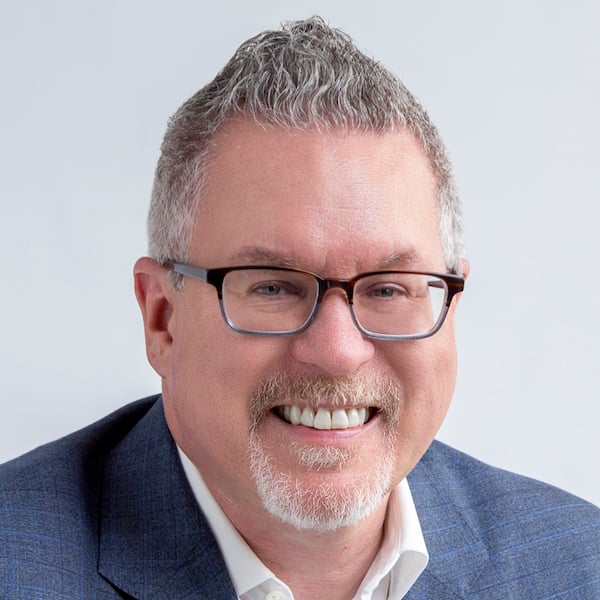
Written by Mark Graban
Mark Graban has served healthcare clients since 2005. Mark is internationally recognized as a leading author and speaker on Lean healthcare. His latest book is "The Mistakes That Make Us: Cultivating a Culture of Learning and Innovation."

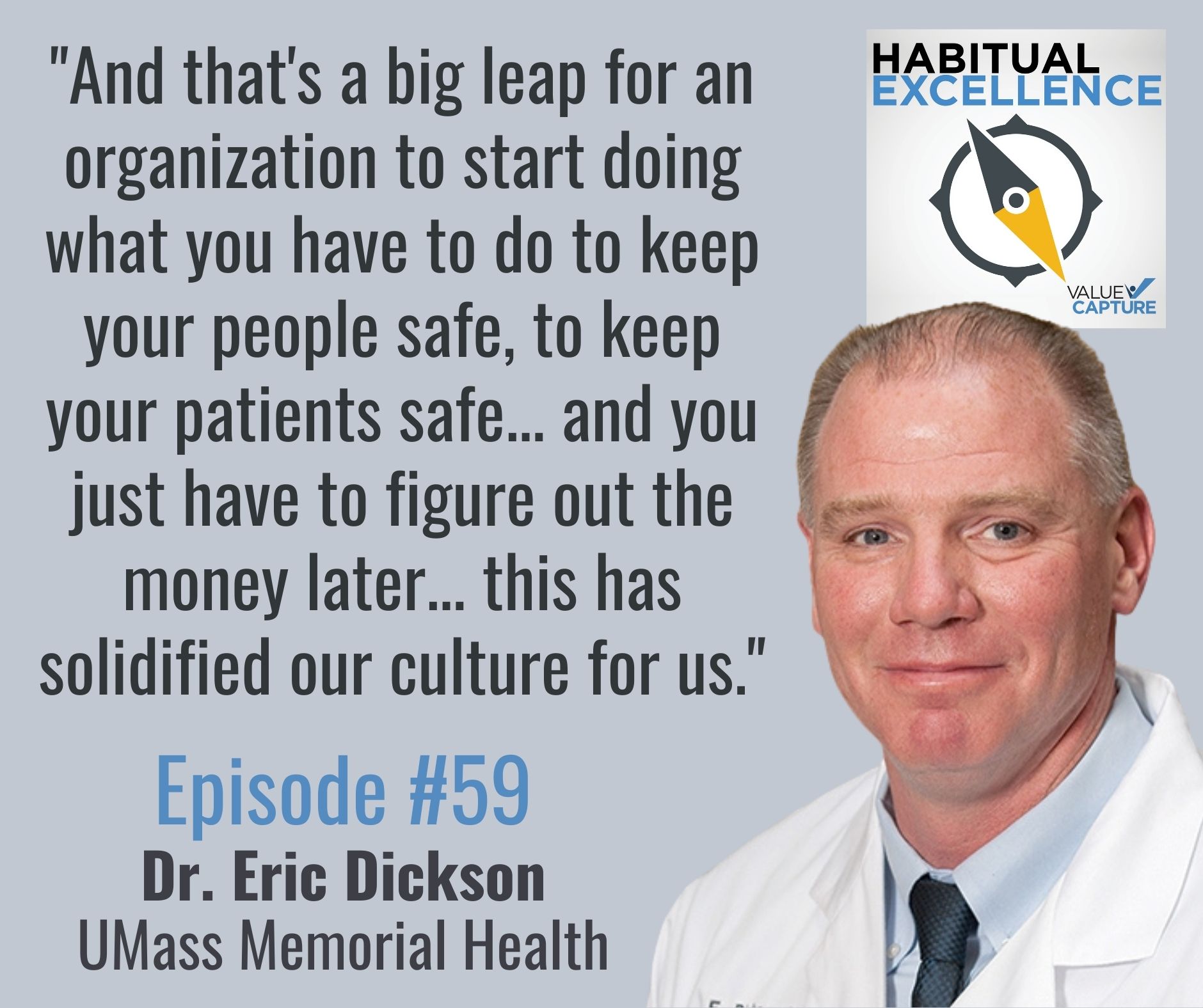
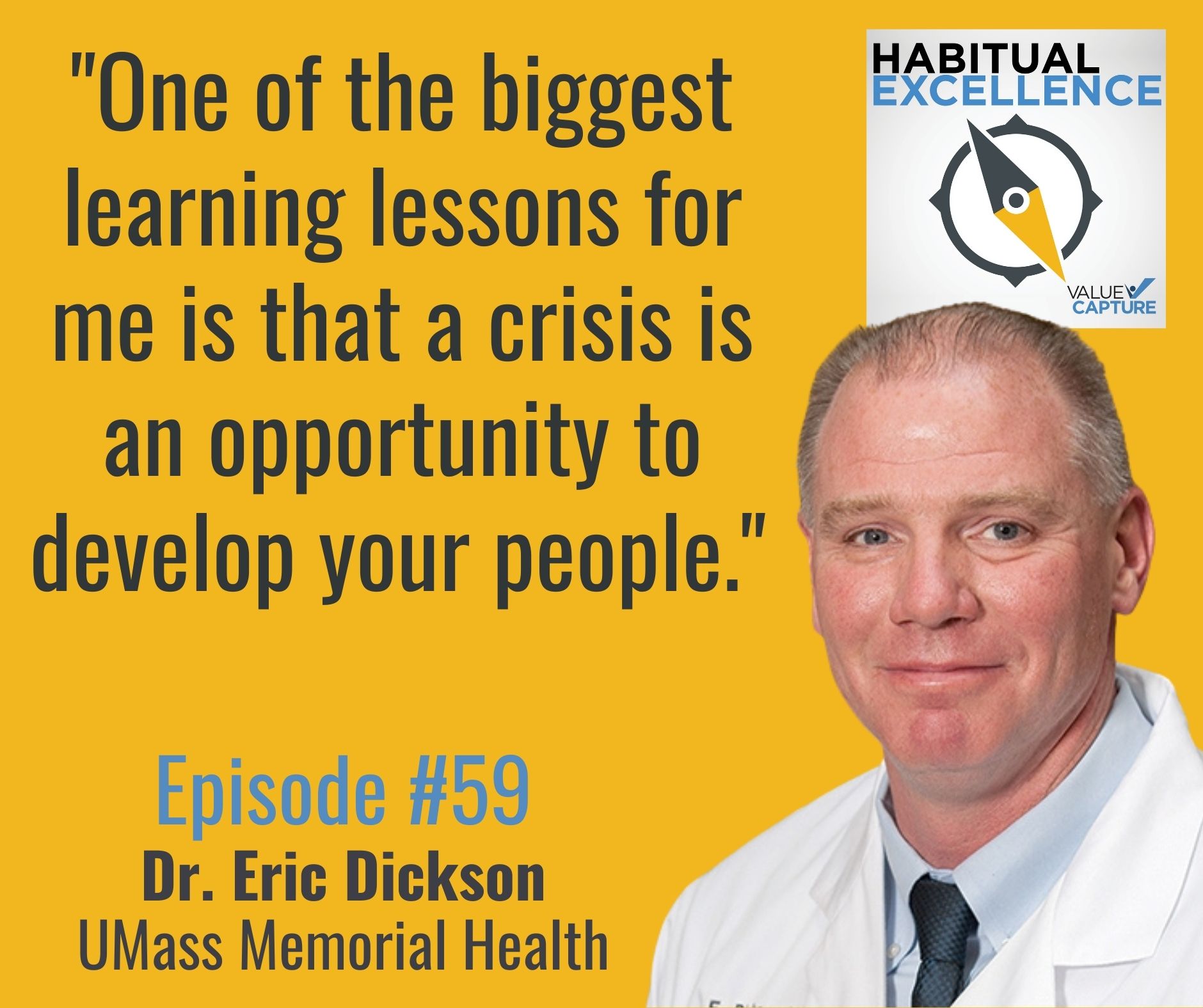
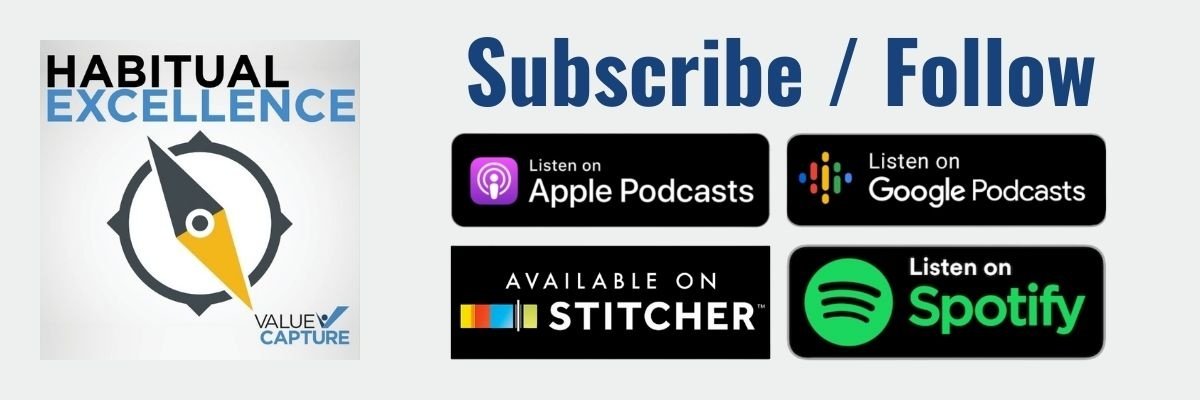
Submit a comment